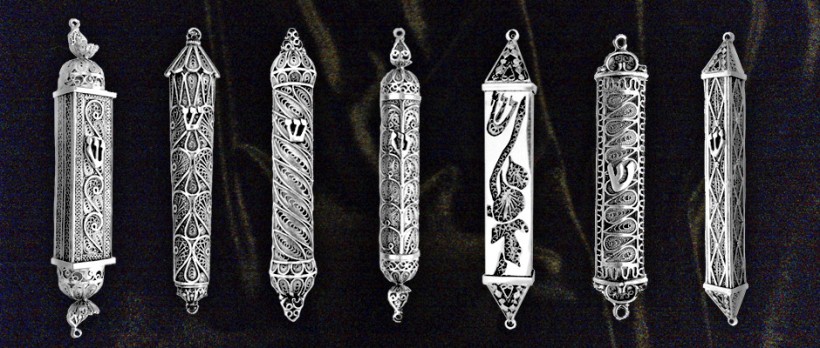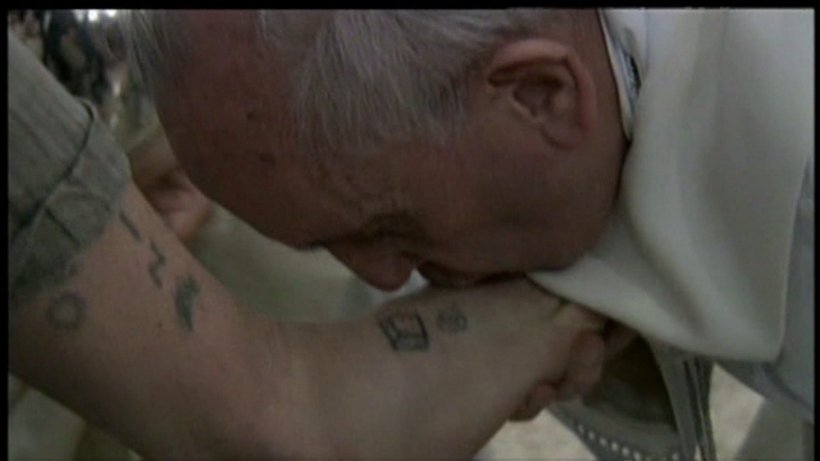
Anyone ever kissed a mezuzah? Or, to be more precise: touched the mezuzah, and then kissed your hand?
A mezuzah hangs on the doorpost of a devout Jewish home. It contains a small paper, with the Shema: “Hear, O Israel, the Lord is God, the Lord alone. You shall love the Lord with all your heart, soul, mind, and strength.”
Deuteronomy commands the people to inscribe the Shema on their doorposts. But the word mezuzah appears for the first time in the Bible in the passage we read every year on Holy Thursday. Exodus 12 commands the people: “Take some of the blood of the Passover lamb, and apply it to your mezuzot, your doorposts.”
Now, a mezuzah can be an exquisite little work of art, adorning the doorway. Generally, they don’t look at all messy. But even the most dainty little mezuzah represents the sprinkled blood of the lamb, the blood which moved the angel of death to pass over the house.
 This year, our Holy Father, Pope Francis, has given us two ways to obtain a jubilee-year indulgence. First, the old-fashioned way: to pass through a Holy Door. Usually, during Jubilee Years, you have to go to Rome to pass through a Holy Door, or at least to a papal basilica. But this year, Pope Francis extended the prerogative for Holy Doors to every diocese.
This year, our Holy Father, Pope Francis, has given us two ways to obtain a jubilee-year indulgence. First, the old-fashioned way: to pass through a Holy Door. Usually, during Jubilee Years, you have to go to Rome to pass through a Holy Door, or at least to a papal basilica. But this year, Pope Francis extended the prerogative for Holy Doors to every diocese.
Trust me, Fr. Matt and I lobbied to get a holy door at St. Andrew’s. But the Bishop decided the cathedral in Richmond should have the holy door for our diocese. Fair enough. Now that winter has ended, the time has come for everyone to plan a little pilgrimage to Richmond, or to the National Shrine in Washington, to pass through the Jubilee-Year door.
The second way Pope Francis gave us to obtain an indulgence this year: doing the spiritual and corporal works of mercy. Feed the hungry, give drink to the thirsty, clothe the naked, shelter the homeless, heal the sick, visit the imprisoned, bury the dead. Comfort the afflicted, counsel the doubtful, instruct the ignorant, admonish the sinner, forgive injuries, bear wrongs patiently, pray for the living and the dead.
The Lord liberated our forefathers from slavery during the Passover, because He loves. He sent His only-begotten Son, the Lamb of the new and eternal covenant, to shed His Blood for us on the cross—because He loves. He gave us the Holy Mass, the sacred priesthood, the Church—because He loves.
The events we read about in the Bible unfold the mystery of divine love, and they have brought about this result: God has opened a door for us. He has opened the door of faith. The door of mercy. The door of divine love.
And one more thing: the jubilee-year door of faith, mercy, and love must also be the door of humility. Faith means humility, since believing the Word involves acknowledging that God knows more than we do. Mercy means humility, since God forgives those who humbly repent. Above all, divine love means humility, since the love of God works through simple, un-glorious, practically invisible deeds.
Brothers and sisters, let’s step through the door—the door of faith, mercy, love, and humility! On the other side of this door lies the Kingdom of God!
